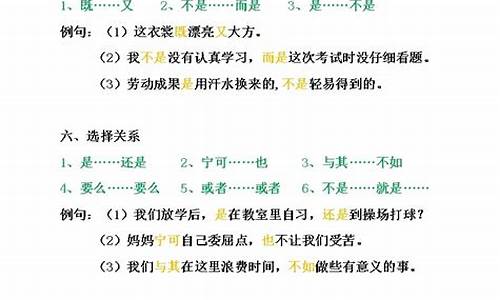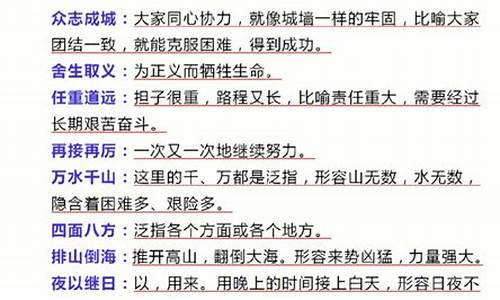Licentiousness 翻译_licentious
1.别太放肆,没什么用什么意思?
2.蛙的读音是什么
3.暗渡陈仓是什么意思
4.求英语26个字母为开头的高褒义词和狠毒的贬义词(每个字母开头都要)
5.浪_的国语词典浪_的国语词典是什么
6.翻译中词义的具体化与抽象化

邂逅
[书面语] meet (a relative, friend, etc.) unexpectedly; run into sb.; meet by chance: 邂逅一位同窗 meet unexpectedly a school-mate
放荡不羁
lead a fast [licentious] life; give full rein to one's low passions; he full swing; he one's fling; he [take] one's swing [one's full swing]; licentious in conduct; unconventional and unrestrained
梦魇
nightmare;incubus
歇斯底里
hysteria; hysteric: 歇斯底里作 go into hysterics; become hysterical; 战争歇斯底里 war hysteria
一无所有
he nothing at all [in the world]; not he a stiver; not he a thing to one's name; not own [he] a thing in the world: 我除了行李被褥之外一无所有。 Apart from clothes and bedding, I he nothing.
单纯
simple; pure: 思想单纯 simple-minded; pure in thought; 象孩子一样单纯 as simple as a child; 问题决不像我们当初想象的那么单纯。 The problem is by no means as simple as we first thought.
沙砾
grit
遍体鳞伤
covered all over with cuts and bruises; be a mass of bruises; beaten black and blue; be black and blue all over; be lacerated and bruised all over; he serious wounds in every part of one's body; The body is all covered with wounds.; The whole body is covered with wounds.
顽强
indomitable; staunch; tenacious: 顽强的革命精神 indomitable revolutionary spirit; 同干旱进行顽强的斗争 put up a tenacious fight against the drought
暧昧
1.(态度、用意含糊; 不明白) ambiguous; equivocal: 恼人的暧昧回答 an offensively ambiguous answer; 态度暧昧 assume an ambiguous attitude; 他的答复非常暧昧。 His reply was full of ambiguities.
2.(行为不光明; 不可告人) dubious; shady; secret: 暧昧关系 dubious relationship
谎言
lie; falsehood: 拆穿谎言 nail a lie to the counter; 谎言骗人 stuff sb. with lies; 一派谎言 a pack of lies; 谎言总是站不住脚的。 Lies he short legs.; Lies are always lame. 事实再一次揭穿了这一谎言。 Facts once again give the lie to the fallacy. 真参半的谎言最险恶。 A lie which is half a truth is ever the blackest of lies.
痕迹
mark; vestige; imprint; impression; trace; trail; print: 不露痕迹 make no sign; 一种古代文明的痕迹 the vestiges of an ancient civilization. 敌军留下了仓皇退却的痕迹。 The enemy's retreat left marks of haste. 岁月在他脸上留下了痕迹。 Age has left its traces on his face.
轨迹
1.[数学] (某点在空间移动的路线) locus; trajectory; trail; trel; path; way; [电子学] trace; line; pathway
2.[天文学] (天体在宇宙间运行的路线) orbit: 我们可以画出地球绕太阳运行的轨迹。 We can draw the earth's orbit round the sun.
迷茫 1.(广阔而看不清) vast and hazy: 远处一片迷茫。 It's vast and hazy in the distance.
2.(迷离恍惚) confused; perplexed; dazed: 迷茫的神情 a confused look
虚伪 sham; false; hypocritical: 虚伪的情谊 hypocritical affection; 虚伪的和平谈判 fake peace negotiations; 知识的问题是一个科学问题, 来不得半点虚伪和骄傲。 Knowledge is a matter of science, and no dishonesty or conceit whatsoever is permissible.
堕落
go downhill; degenerate; fall [drop] by the way side; go to the bad; go to the deuce [devil]; sink low: 受金钱的诱惑而堕落 degenerate under the temptation of money; 堕落成罪犯 degenerate into a criminal; 走上堕落、犯罪的道路 embark on the road of degeneration and crime; 政治上堕落 be politically degenerate; 他怎么会堕落到这种地步呢? How could he sink to such depths? 现在的青年在堕落吗? Are the young people of today degenerating? 饮酒和使他彻底堕落了。 Drinking and gambling sank him completely.
惨淡
1.(暗淡无色) gloomy; dismal; bleak: 天色惨淡 gloomy sky; gloomy weather; 在惨淡的星光下 in the dim starlight
2.(在困境中艰苦地进行) labourious; arduous
3.(凄凉) dreary; miserable: 惨淡的生活 forlorn life; 惨淡的笑容 a wan smile
搁浅
1.(船只等陷在浅滩上) stranded; stranding; aground; beach; ground; strand; take the ground; run aground; run ashore: 船搁浅了。 The ship got stranded.
2.(比喻事情遇阻停顿) deadlock; be held up; be at a deadlock; reach a deadlock: 这个由于经费问题而搁浅了。 The plan deadlocked over the funds. 会谈搁浅了。 The negotiations he come to a deadlock.
结局
final result; outcome; ending; grand finale; upshot: 悲惨的结局 tragic result; sad dénouement; 自然的结局 natural outcome; 合乎逻辑的结局 the logical ending; 注视发展的结局 watch the outcome of an affair; 比赛只剩下5分钟了, 可是结局仍然难以预料。 Five minutes from the end, the outcome of the match was still in dou. 结局好, 样样好。 All's well that ends well.
天灰 没查到
别太放肆,没什么用什么意思?
gay
D.J.[ge!]
K.K.[ge]
adj.(形容词)
gay.er,gay.est
Showing or characterized by cheerfulness and lighthearted excitement; merry.
快乐的,愉快的:表现出欢乐的、愉快的激动的,或具有其特征的;高兴的
Bright or lively, especially in color:
色彩鲜活的:明亮的或怡人的,尤指颜色:
a gay, sunny room.
一间明快的、充满阳光的房间
Of, relating to, or sharing the lifestyle and concerns of the homoual community.
同性恋的:有关或与同性恋者的生活方式或问题有联系的,具有同性恋者的生活方式的
Homoual.
同性恋的
Given to social pleasures.
好寻欢作乐的
Dissolute; licentious.
放荡的;无法无天的
n.(名词)
A gay person, especially an openly gay person in contemporary society.
活跃的人:快乐的,尤指当代社会中的思想开放的人
单词gay 其用法已被普遍接受, 指的是美国的同性恋团体及其成员;在这种用法中,它一般小写。Gay 区别于 homoual, 前者强调同性恋者的文化和社会方面。许多作家把gay 限定于男性同性恋者, 但这个单词也可用于指两种性别的同性恋者,当上下文的言外之意不太明确时,词组同性恋男性和同性恋女性 可以被使用。 就象其他从形容词派生来的社会群体名词一样(如,黑人 ), gay 如果当作为一个名词使用,指一些特殊的个体时,可能会被认为带有攻击性, 如在There were two gays on the panel; 在此处应该用词组gay people 来代替。 但是并没有人反对其名词的复数形式,指一般的同性恋团体,如句子同性恋者们已经团结起来对抗政策 参见 homoual
Gay
Gay
AHD:[g?] John (1685-1732)
D.J.[ge!]
K.K.[ge]
NONE(无词性)
English writer known especially for his playThe Beggar's Opera (1728).
盖伊,约翰:(1685-1732) 英国剧作家,尤其因其剧作《乞丐的歌剧》 (1728年)而闻名
gay
[^ei]
adj.
(gayer, gayest)
快乐[活]的,愉[轻]快的,欢欣的
华丽[美]的, 艳丽的; 鲜明的
[贬]放[*]荡的; 寻欢作乐的
[美俚]同性恋的
[美俚]放肆的, 无礼的, 脸皮厚的; 冒失的
gay music
轻快的音乐
gay cat
[美卑]小流氓
gay dog
[美俚]纵情逸乐者, 追求声色者
gay lady
G-Libaration [美]男子同性恋解放运动
The city was gay with all colors of bunting.
这个城市到处飘扬着五色缤纷的旗帜。
go gay (=lead a gay life)
过放荡的生活
Gay
[^ei]
n.盖伊(女子名)
蛙的读音是什么
原文是:May the force be with you.翻译为中文是:愿力量与你同在。
“别太放肆,没什么用”是May the force be with you这句话的谐音而已,为了搞笑。
“别太放肆,没什么用”的英文翻译是:Don't be too licentious, its useless.
大笑江湖剧情简介:
吴迪(小沈阳饰)是由母亲含辛茹苦独立抚养长大的孩子,作为一个平凡的小鞋匠,日复一日的过着恬淡的日子。直到有一天,一名女扮男装的侠客月露(林熙蕾饰)(真实身份是皇宫娘娘)来到他的补鞋铺,她正在追捕一名朝廷通缉犯“田”,而吴迪为了帮助月露也意外卷入了这一场打斗。
这段奇遇让他燃起了侠客梦和相思病。同时,在京城里的皇上也正因“月露”娘娘的擅自离宫而苦恼着,大太监成公公(徐少强饰)便建议皇帝举办武林大赛,吸引月露参加,并且安排月露成为冠军,以让皇帝与娘娘重修旧好。
不出所料,消息发布之后,被蒙在鼓里的月露山兴高烈要回宫参赛。在吴迪方面,他为了交还月露留下的鞋子也踏上了旅途,他先是船上遇见一群绑着的河盗,并且仗义挺身而出与老河盗(赵本山饰)打了起来。
老河盗的宇宙剑法很“给力”,让吴迪很“受力”,危急之下,一个神秘老人出现了,吴迪脱险之后,又遇见了一个又一个江湖群雄,有狂追他的“武林三凤”,有会吃人的“火工头陀” ,还有宫廷特务“盲剑客”,因此引起了一串串武林大混战。不过最终的大阴谋才刚刚出现。
最终,吴迪的爱感动了月露,她在皇帝的默许之下再度离开皇宫,决定和吴迪长相厮守。他们隐居在一个叫作“剑冢”的地方,成为了一代武林。
暗渡陈仓是什么意思
蛙
wā
形
*邪〖licentious〗。如:蛙咬(*声俗乐);蛙声(*声,*邪的乐声);蛙歌(*邪之声)
凹隐。扳着脸的样子〖low-lying〗
那陈经济把脸儿蛙着不言语。——《》
蛙人
wārén
〖frogmen〗为长时间在水下游动而戴着面罩、备有脚蹼、橡皮衣、氧气筒等的潜水者
蛙泳
wāyǒng
〖breaststroke〗游泳的一种姿势:两肩平行水面,两臂向头前方伸出,然后立即从两旁向后划动,手掌向外,同时下肢做蛙式后蹬、夹水。因像蛙游的姿势而得名
求英语26个字母为开头的高褒义词和狠毒的贬义词(每个字母开头都要)
暗渡陈仓是什么意思呢?让我带您来了解下它的读音、出处、英语翻译、词性、近反义词及造句吧。
暗渡陈仓是什么意思
暗渡陈仓,指正面迷惑敌人,而从侧翼进行突然袭击。比喻暗中进行活动。陈仓:古县名,在今陕西省宝鸡市东,为通向汉中的交通孔道。?明修栈道,暗渡陈仓?是古代战争史上的著名成功战例。
读音:?n d? ch?n cāng
解释:渡:越过。陈仓:古代县名,在今陕西省宝鸡市东,为关中、汉中之间的交通要道。汉高祖刘邦用韩信计,偷渡陈仓定三秦。亦比喻秘密进行的活动
出自:元?无名氏《暗渡陈仓》第二折:?着樊哙明修栈道,俺可暗度陈仓古道。这楚兵不知是智,必然排兵在栈道守把。俺往陈仓古道抄截,杀他个措手不及也。?
示例:孤家用韩信之计,明修栈道,~,攻定三秦,动取五国。◎元?无名氏《气英布》第一折
语法:动宾式;作谓语、定语;比喻暗中活动
英文:do one thing under cover of another
灯谜:夜游宝鸡城
暗渡陈仓的近义词
暗送秋波 偷天换日 偷梁换柱 移花接木 明修栈道 明争暗斗 瞒天过海
暗渡陈仓的反义词
明目张胆 明火执仗 正大光明 光明磊落
暗渡陈仓造句
他其实早就知道这件事了,只是没有说出口,却明修栈道,暗度陈仓。
八路军战士暗渡陈仓攻下了长安城。
我军部队为速战速决,明修栈道,暗渡陈仓,很快摧毁了敌人的根据地。
公安民警暗渡陈仓,对一个盗窃团伙实施突击抓捕,缴获了不少赃物。
放荡不羁是什么意思
拼音:f?ng d?ng b? jī
解释:羁:约束。放纵任性,不加检点,不受约束。
出自:《晋书?王长文传》:?少以才学知名,而放荡不羁,州府辟命皆不就。?
示例:明?凌濛初《初刻拍案惊奇》卷十六:?平时与一班好朋友,只以诗酒娱心,或以山水纵目,~。?
语法:动宾式;作谓语\定语、宾语;指不受约束
褒贬:贬义词
英语:lead a fast [licentious] life;give full rein to one's low passions;he one's fling;be unconventional and uninhibited
放荡不羁的近义词
玩世不恭 荡检逾闲 落拓不羁 不修边幅 吊尔郎当 洒脱不拘 放浪形骸 放荡任气 放任自流
放荡不羁的反义词
循规蹈矩 规行矩步 严以律己 安分守己 规规矩矩 随遇而安 一成不变 安守本分 安贫乐道
放荡不羁造句
他喜欢这种放荡不羁的洒脱生活。
你过着如此放荡不羁的生活, 生活会变得没有意义和颓废。
青少年从小就要学会律己,放荡不羁的生活对身心都不健康。
浪_的国语词典浪_的国语词典是什么
褒义词
agile 灵活的,机敏的
bountiful 慷慨的;宽大的
complaisant 彬彬有礼的
dispassionate 平心静气的;冷静的
ebullient 热情洋溢的
flamboyant 耀眼的,灿烂的
gallant 英勇的,豪侠的
hospitable 好客的;(对新思想等)易接受的
indomitable 不屈服的,不屈不挠的
judicous 明智的;审慎的
knighthood 骑士风格,侠义精神
laconic 简洁的,简明的
magnanimous 宽宏大量的;高尚的
noteworthy 引人瞩目的
omniscient 全知的,无所不知的
pious 虔诚的
quakerish 像贵格会教派的,谨严的
regulgent 辉煌的;灿烂的
sagacious 有洞察力的,有远见的
trustworthy 值得信赖的
unyielding 不屈的;刚强的
veracious 说真话的,可靠的
winsome 迷人的,讨人喜欢的
xenium 赠予宾客的礼物
youthful 年轻的,有朝气的
zealous 热心的,热情的
贬义词
atrocious 残暴的,凶恶的
barbarian 粗鲁无礼的;野蛮的
caitiff 卑劣的;胆小的
dictatorial 独裁的;傲慢的,专横的
effrontery 厚颜无耻
felonious 极恶的,犯重罪的
gruesome 可憎的,令人厌恶的
hysterical 歇斯底里的
indulgent 纵容的
jaded 疲倦不堪的;厌倦的
kleptomaniac 有盗窃癖的人
licentious 放肆的
malodorous 有恶臭的
nauseous 令人作呕的;使人厌恶的
obsequious 谄媚的,拍马屁的
perfidious 背信弃义的
queasy 令人作呕的
renous 贪婪的
swindler 骗子
tyrannical 暴君的;专横的;残暴的
unsightly 不雅观的,难看的
villainous 恶毒的,凶恶的,恶劣的
willful 任性的,固执的
xanthippe 悍妇;泼妇
yy 喜欢叫嚷的;粗汉的
zany 滑稽的;古怪的;愚蠢的
————————————————————
手打手找,累死了……满意的话再加点分嘛~_(:3」∠)_
翻译中词义的具体化与抽象化
浪_的国语词典是:毫无目的的漫游、流浪。词语翻译英语toloiter,tohangaround,dissolute,licentious德语herumgammeln,tr_deln法语fainéanter,battrelepé,vagabonder,errer,dissolu,dissipé。
浪_的国语词典是:毫无目的的漫游、流浪。词语翻译英语toloiter,tohangaround,dissolute,licentious德语herumgammeln,tr_deln法语fainéanter,battrelepé,vagabonder,errer,dissolu,dissipé。拼音是:làngdàng。结构是:浪(左右结构)_(上下结构)。
浪_的具体解释是什么呢,我们通过以下几个方面为您介绍:
一、词语解释点此查看详细内容
浪荡làngdàng。(1)东逛西逛,无所事事。(2)行为不加约束、任意胡为。(3)水浪翻腾。
二、网络解释
浪荡浪荡是一个汉语词汇,拼音是làngdàng,意思是到处游逛,不务正业;游荡;行为不加约束、任意胡为、行为不检点;放荡,出自宋姜夔《契丹歌》。
关于浪_的成语
浪酒闲茶狂涛骇浪长江后浪推前浪赶浪头沧浪老人后浪催前浪浪蕊浮花浪子回头骏波虎浪后浪推前浪
关于浪_的词语
浪酒闲茶狂涛骇浪骏波虎浪乘风兴浪赶浪头鲸波怒浪浪子回头鲸涛鼍浪浪蕊浮花
点此查看更多关于浪_的详细信息
翻译中词义的具体化与抽象化
英语或以物质名词取代抽象名词,或以人的某种表情或动作揭示人的内心世界,或寓深刻哲理于栩栩的形象之中,诸如此类的以“实”喻“虚”的表达花抽象为具体,变空洞为形象,令读者如睹其物,如闻其声,经久不忘。有人认为:翻译中学会抓住精神实质,摆脱原文表层结构的束缚,防止从“实”到“实”的转换,做到licentious是至关重要的问题。此观点尚欠推敲。对于英语中以实喻虚的形象表现手法,翻译时应想方设法维系原文的具体性及形象性,一个常用的手段即是从“实”到“实”,将英语的以实喻虚译成汉语的以实喻虚。
最近读到这样一句:The magic spades of archaeology he given us the whole
lost world of Egypt.
其译文是:考古学家变魔术似的把古埃及的整个世界都给我们发掘出来了。且不论magic一词译成“像变魔术似的”是否恰当,译者将原文中用得绝妙的spades隐去不译,不能不说是一大缺憾。若将spades一词直译如何?如译:考古学家神气的铁铲把古埃及的整个世界都给我们发掘出来了。
尽管英汉两种语言属于不同语系,各自具有自身的特点和习惯,但却“共享”着为数甚众的以实喻虚的类似表达,许多形象语汇的引申义及其引起的联想也是“不谋而合”的。汉译时,尽可取事半功倍的从“实”到“实”的“拿来主义”,直译无妨。如:
But when you've learned English, you'll find it a bridge to so
much knowledge.
但是,当你学会了英语,你就会发现它是通向如此丰富的知识的桥梁。
The invention of printing was a mile-stone in human progress.
印刷术的发明是人类进步的一个里程碑。
I hope to oid straying on the one hand into the sands of foreign
policy, and on the other into the marshes of international law.
我希望不要偏离正题,一方面避免误入外交政策的沙漠,另一方面避免陷入国际法的沼泽。
Chaucer is buried in the "Poets' Corner", as might he been
expected, but interestingly enough, not because he is the father
of English poetry, but because he hened to be Clerk of the
Works when he died in 1400.
不出所料,乔叟安葬在“诗人之角”,但是有趣的是,他被葬在这里,并非因为他是英国诗歌之父,而是因为他在1400年去世时,恰好这项工程的主管。
If we attack quickly, we can nip the enemy's plans in the bud.
如果我们迅速进攻,我们可以把敌人的消灭在萌芽状态。
We want to learn to laugh in the face of the inevitable, to smile
at the looming of the death.
我们需要学会对不可避免的事情报以大笑,甚至以微笑面对死亡的威胁。
至于哪些形象词汇可以作如上直译,哪些需意译,在相当程度取决于汉语遣词造句的习惯,似无规律可循。同一个物质名词在此句可直译,在彼句则需意译。如:
His novel is a mirror of the times.
他的是时代的一面镜子。
The newspaper claims to be the mirror of public opinions.
该报宣称忠实反映了公众的意见。
上文谈及的spades一词可以直译,但同一篇文章中的pick and shovel却无法直译。如:
It has taken many a pick and shovel to prove to the world that the
history of Greece went back long before the year 776BC.
向世人证明希腊的历史可以追溯到公元前776年做了大量的考古发掘工作。
当然,我们所说的想方设法维系原文的具体性和形象性是以统筹“信达雅”之间的辨证关系为先决条件的,并不是一味地求形象而偏废其他翻译要义的“削足适履”式的硬译。
If the term sounds unscientific to the 20th-century ears, let us
remember there is a definite connection between marshy lands and
malaria.
若将上句中的ears译成“耳朵”,岂非可笑?
What is learned in the cradle is carried to the gre.
句中的the cradle和the
gre十分具体形象,读来韵感强烈,但若直译成:一个人在摇篮中所学的东西会带到坟墓中去。从汉语的欣赏习惯来看,译文就显得过直过露,委实有点欠“雅”。不若意译成:少时所学,到老不忘。
将以实喻虚表达中的“实”作“虚”译也是一种常用的方法,但是,这仅是在直译行不通的情况下的一种方法。精彩的以实喻虚的表达仅能囫囵意译,也是一种“不可译性”的体现。原文的妙处也只能由译者“独享”及“意会”,而无法以汉语“言传”,与读者“同享”。
How do we account for this split between the critics and the
readers, the head and the heart?
评论家和读者之间,也就是理智和感情之间的这种分歧如何解释呢?
Sam knows he can depend on his family, rain or shine.
山木知道不论境遇如何,他都可把家庭作为靠山。
There is a mixture of the tiger and the ape in the character of
the colonialists.
殖民主义者的性格既残暴,又狡猾。
在很多情况下,无法通过直译来保持原文的具体性及形象性的时候,意译也并非就是的办法。“变通”也是一条理想的出路。所谓“变通”,即在“信”的前提下,扬汉语之长,用间接的、灵活的手段来维系原文的具体性。具体言之,有以下两种常见的方法。
首先,舍去原文中原有的具体形象,借用或套用本族语中为人熟知的形象或借喻,这是一种值得重视的翻译工作中富有创造性意义的劳动。实践证明,汉语的形象词汇浩如烟海,用之不竭。
Betty stands head and shoulder above her classmates in playing
tennis.
名词词组head and
shoulder作状语,形象传神,是否可以活用汉语成语“鹤立鸡群”,而将原句译成:贝蒂打网球的水平鹤立全班。
He ge up the sword for the plough.
The sword 和 the plough的内涵意义为:military
service和agriculture。若将此句硬译成“放下了刀剑,拿起来犁耙”则有悖于汉语习惯,是否可套用成语,译成:他解甲归农了。
The history teacher told us that making an outline kills two birds
with one stone, it makes us study the lesson till we understand
it, and it gives us notes to review before the test.
历史老师说立出提纲可以一箭双雕,既可以帮助我们理解课文,又为我们复习应试提供材料。
We ourselves are separated from the wise desicion on these
important issues by only the lightest curtain.
我们对这些重要问题作出明智的决定仅一步之遥。
其次,运用“增补词汇”的方法。
How do you expect me to fall in love with someone who speaks like
a book all the time?
你怎么能指望我去钟情于一个专爱咬文嚼字的书呆子呢?
There is much woman about him.
他的举止颇带女人气。
That peninsula tongues southward into the sea.
那个半岛呈舌形伸入海中。
The discovery of penicillin was a monument in medical research.
青霉素的发现是医学研究的一块丰碑。
He bombarded her with questions.
他连珠炮似的向她提出了许多问题。
说及以“变通”的方法来维系原文的具体性及形象性,英谚汉译为我们提供了不少值得借鉴的有益经验,如:
He who has a mind to beat his dog will easily find his stick.
欲加其罪,何患无辞。
Two dogs fight for a bone, and a third runs away with it.
鹬蚌相争,渔翁得利。
Faults are thick where love is thin.
一朝情义淡,样样不顺眼。
He that will thrive must rise at five.
五更起床,百业兴旺。
取所谓“变通”的办法,同样不能停留在语言的表层结构做机械的转换。
John knew he was skating on the ice, but he could not resist
teasing her sister about her boyfriend.
句中的skating on the
ice貌似与汉语成语“如履薄冰”相吻合,但一经斟酌,我们便发现,此成语用于弟弟同姐姐就其男友问题而开玩笑的情景,未免有点危言耸听,言之过甚。不如将skating
on the ice“虚”译成“可不是闹着玩的”。
文章的语体属性也始终应在译者的头脑中占有一席之地。如:
a. The church frowned on palmistry because of its pagan origin.
b. Mary wanted to go to Europe by herself, but her parents frowned
on the idea.
句a宜意译:教会反对看手相,因为它源于异教。句b则可直译:马里欲独自去欧洲,对此其父母紧蹙双眉。
以上所述是英语中以实喻虚的表达汉译的问题,下面谈一下英语中以虚代实,即以抽象名词指具体的人或物质的汉译问题。
有人认为:
有必要把它们(指抽象名词)译的比较具体、明确来保证与原文相适应的可读性。我们需要首先弄清的一个问题是:将抽象名词译的比较具体、明确,究竟是指通过“译”这一手段将其“加工”成含义具体的名词呢?还是此类抽象名词本身即含有具体的意义?这是一个涉及如何正确理解及认识英语中一部分抽象名词的带普遍性意义的问题。客观情况是:英语中的一些抽象名词在特定的上下文中的含义是具体的而并非是抽象的。以有人所引的例句为例:As
a boy, he was the despair of all his teachers.
句中的despair的固有含义之一是:somebody that causes loss of hope,令人失望的人。
以虚代实的抽象名词能大大简洁英语的表达,是一种不为鲜见的语言现象。就其特征而言,此类抽象名词可作何种分类呢?据笔者管见,似可分成两大类。一类是指形形的“人”的抽象名词,如:
Is Jane a possibility (=a suitable person) as a wife for Richard?
简是做理查德妻子的合适人选吗?
Our son has been a disointment(=someone dissapointing) to us.
我们的儿子成了令我们失望的人。
He's an influence (= the person that has the power to produce a
good moral effect) for good in the town.
他是这城里影响他人行善的人。
His skill at games made him the admiration (= a person that causes
such feelings) of his friends.
他的运动技巧使他成为友人称羡的人。
His new car made him the envy (= a person that makes someone wish
to be like the person) of every boy in the neighbourhood.
他拥有一辆新轿车,为此他成了邻里男孩们的羡慕者。
My dad has three dependents (= a person who depends on another for
material support): my mother, my sister and I.
爸爸需养活三口人:妈妈、姐姐和我。
另一类是指各种各样具体物质的抽象名词,如:
He you read any humour (= something designed to induce laughter
or amusement)recently?
近来你读了什么幽默作品吗?
The big house on the hill is my ambition. (= the object desired).
山上的那间大屋是我企望得到的东西。
What's your greatest desire(= something longed for)?
你最想得到的是什么东西?
This is not a real gun, but it is a good imitation (= a thing that
imitates something else).
这不是一支真枪,但却是一件极好的仿制品。
He the party invitations (=a written request)been sent out?
晚会的请柬发出去了吗?
Their transportation (= a means of transport)was camel.
他们的运输工具是骆驼。
I'm reading all the chief criticisms (= a review or other article
expressing such judgement and evaluation) of the play.
我正在阅读有关此剧本的主要批评文章。
最后值得一提的是:人类的语言在其丰富多彩的语言实践中不断发展变化着。比较而言,具体形象的表达总是更易博得人们的青睐。英语中若干具体形象的表达也在影响着汉语,以至于汉语中也出现了若干从英语脱胎而来的新鲜的形象词汇。如:
It was in the 1960s that people in Britain began to talk about the
"permissive society" and the "generation gap".
此句中的generation gap
曾被先后译作“长辈与年轻一代之间的隔阂”以及“世代隔阂”,今天已被广泛地译成“代沟”。与此同时,“代沟”一词亦已始见于国内的书刊及报端,而18年首版的《现代汉语词典》尚未收入“代沟”一词。
一个新的词汇的出现及其使用是一个复杂的约定俗成的社会性问题。在翻译中切不可为求形象性而主观杜撰令人误解甚至大惑不解的冷词涩字。
声明:本站所有文章资源内容,如无特殊说明或标注,均为采集网络资源。如若本站内容侵犯了原著者的合法权益,可联系本站删除。












